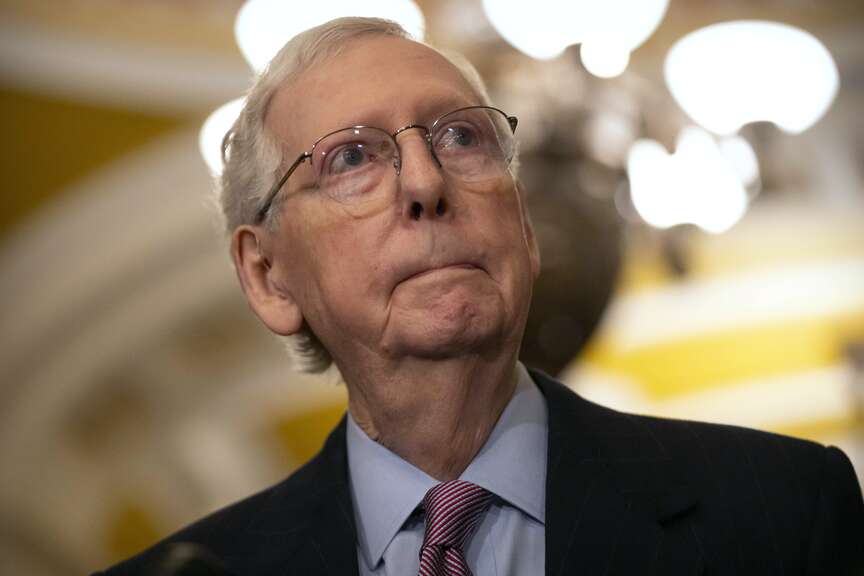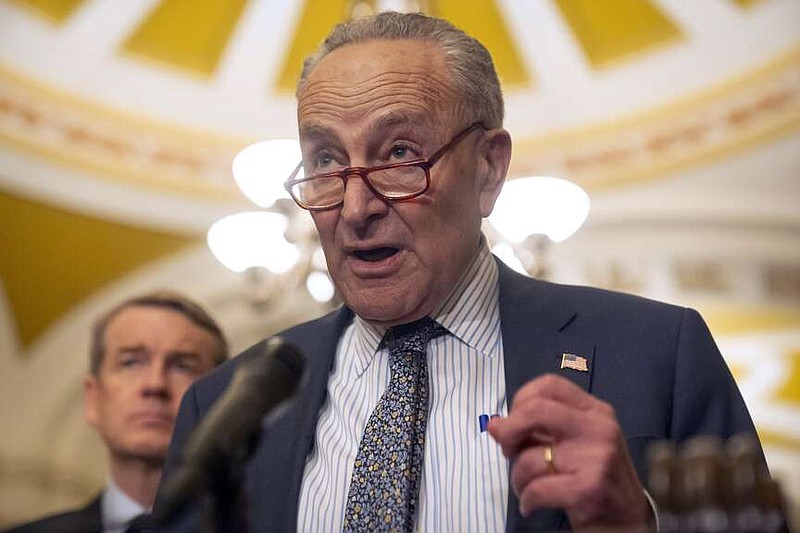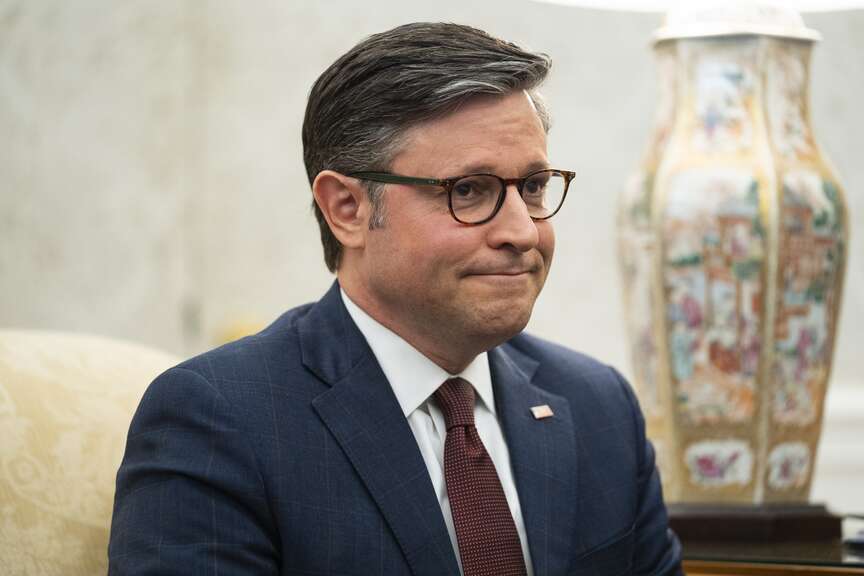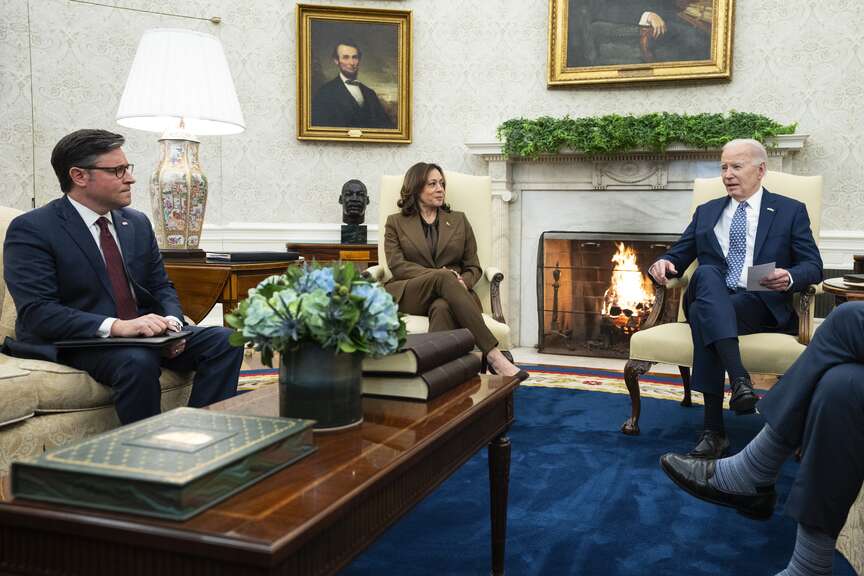WASHINGTON -- Congressional leaders emerged from an "intense" Oval Office meeting with President Joe Biden on Tuesday speaking optimistically about the prospects for avoiding a partial government shutdown, but with new uncertainty about aid for Ukraine and Israel as the president and others urgently warned Speaker Mike Johnson, R-La., of the grave consequences of delay.
Biden called the leaders to the White House in hopes of making progress against a legislative logjam on Capitol Hill that has major ramifications not just for the United States but for the world as Ukraine struggles to repel Russia's invasion with weapons and ammunition starting to run short.
"The need is urgent," Biden said of the Ukraine aid. "The consequences of inaction every day in Ukraine are dire."
Biden hosted Senate Majority Leader Charles Schumer, D-N.Y.; House Minority Leader Hakeem Jeffries, D-N.Y.; and Senate Minority Leader Mitch McConnell, R-Ky., in the Oval Office along with Johnson and Vice President Kamala Harris. After the more than hourlong meeting, Biden pulled Johnson aside for a private conversation.
Upon exiting the meeting, Democratic leaders were blunt about the dangers Ukraine is facing.
"We said to the speaker, 'get it done,'" Schumer said. "I said I've been around here a long time, it's maybe four or five times that history is looking over your shoulder and if you don't do the right thing, whatever the immediate politics are, you will regret it."
Referring to Johnson, he said, "Really, it's in his hands. It's in his hands."
Schumer, who was joined by Jeffries in describing how the meeting went, called the session "one of the most intense I've ever encountered" in the Oval Office.
Johnson spoke to reporters without Senate Republican leader Mitch McConnell by his side. McConnell voted for a $95 billion foreign aid bill earlier this month that would aid Ukraine and Israel, replenish U.S. defense systems and provide humanitarian assistance for Gaza and the West Bank, Ukraine and other populations caught in conflict zones.
The bill passed the Senate 70-29, but the Republican-led House has not acted on it, despite pleas from McConnell and others for action.
Arkansas' Republican senators split their votes on the bill, with John Boozman voting for it and Tom Cotton voting against it.
Johnson, who rejected a U.S.-Mexico border security compromise that was eventually stripped from the final product, signaled no change in his position on Ukraine aid. He said the Senate's package "does nothing" to secure the U.S.-Mexico border, the GOP's demand in return for helping Ukraine.
"The first priority of the country is our border and making it secure," Johnson said.
The speaker's continued call for border changes has frustrated senators, who spent months negotiating a bipartisan border deal only to have House Republicans reject it at the urging of former President Donald Trump.
The bill would have denied migrants the ability to apply for asylum at the border if the number of daily crossings became unmanageable for authorities, among other major changes.
"It's time for action," Johnson said of the border. "It is a catastrophe, and it must stop."
Schumer said Democrats, too, want to tackle the problems at the U.S-Mexico border, but that it will take time and "we have to do Ukraine right now." He said he discussed during the meeting his visit last week to Ukraine with other lawmakers and recounted the agonizing stories told by soldiers who have no ammunition left to fire.
In the meeting, "we made it clear how vital this was to the United States. This was so, so important, and that we couldn't afford to wait a month or two months or three months because we would in all likelihood lose the war, NATO would be fractured at best, allies would turn away from the United States and the boldest leaders, the boldest autocrats of the world ... would be emboldened," he said.
GOP ADDITIONS
House Republicans have loaded up their spending bills with hundreds of partisan policy mandates, a vast majority of which had no chance of passing the Democratic-controlled Senate or being signed by President Joe Biden. They include measures to target various pieces of Biden's agenda, such as one to restrict access to abortion medication and another to restrict the Department of Veterans Affairs from flagging veterans deemed mentally incompetent in a federal background check needed to buy a gun.
With just three days remaining before funding lapses for roughly one-quarter of the government, some of those issues were emerging as major sticking points in negotiations to reach a deal to keep the money flowing. Republicans also are objecting to a proposed increase for federal programs aimed at providing nutrition assistance for low-income families as well as for women and infants.
Complicating the picture for Johnson, Republicans have been divided over what to push for in spending talks. Ultraconservative lawmakers who rarely support spending legislation have been the loudest voices in favor of cuts and hard-line policy provisions, but more mainstream and politically endangered Republicans have refused to back them.
In one case last fall, the more moderate lawmakers helped sink a spending bill that prevented money from being spent to enforce a District of Columbia law that protects employees from being discriminated against for seeking contraception or abortion services.
Republicans have also sought to reverse a new rule by the Food and Drug Administration allowing mifepristone -- the first pill used in a two-drug medication abortion regimen -- to be distributed through the mail and at retail locations. They also want to bar the VA from flagging that a veteran has been deemed mentally incompetent in a federal gun background check without a court order.
And they are opposing Democratic efforts to increase nutrition benefits for low-income mothers and children beyond what Biden initially requested, a boost that Democrats argue is necessary to meet current needs. The spending bill House Republicans advanced would have kept funding for the program at last year's levels.
"These hard-right chaos agents in the House do not represent a majority of Republicans in the country," Schumer said Tuesday before the White House meeting. "They do not represent a majority of Republicans in the Senate. They do not even represent a majority of Republicans in the House, yet they are trying to bully everyone else into submission to get what they want."
Central Intelligence Agency Director Bill Burns also joined Tuesday's meeting. Burns has played key roles coordinating the U.S. response to Russia's invasion of Ukraine as well as efforts to secure the release of hostages held by Hamas after its Oct. 7 attack on Israel.
Upon returning from the meeting, McConnell called on the House to take up the Senate-passed bill. Many supporters of the bill predict that it would pass overwhelmingly on the House floor if Johnson were to bring it up for a vote, but doing so would risk enormous blowback from some in his conference who don't support more help for Ukraine. Some have even threatened his job if he allows the bill to pass.
"We don't want the Russians to win in Ukraine and so we have a time problem here. And the best way to move quickly and get the bill to the president would be for the House to take up the Senate bill," McConnell said.
Apart from the national security package, government funding for agriculture, transportation, military construction and some veterans' services expires Friday. Funding for the rest of the government, including the Pentagon, the Department of Homeland Security and the State Department, expires a week later, on March 8, the day after Biden is set to deliver his State of the Union address.
"It's Congress' responsibility to fund the government," Biden said. "A government shutdown would damage the economy significantly. We need a bipartisan solution."
Driving the impasse are the same dynamics that have persisted since this Congress began a year ago.
Hard-right Republicans have tried to use their party's razor-thin majority in the House as leverage to wring spending cuts and conservative policy conditions on how federal money can be spent from Biden and Democrats in the Senate. The Republican speaker -- first Kevin McCarthy and now Johnson -- has worked to appease that restive group, agreeing to tailor the spending bills to its demands, even though many of its members have rarely, if ever, supported appropriations bills during their time in Congress.
The result has been that congressional leaders have three times had to turn to Democrats to help them fund the government with short-term spending bills.
Right-wing Republicans have grown increasingly unhappy as they have watched government funding keep flowing without cuts or policy changes, and they are ratcheting up pressure on Johnson to secure some kind of conservative victory in the current spending negotiations.
Johnson told Republicans on Friday during a conference call that they should not expect the inclusion of many of their major policy priorities, though he said he expected to secure a number of more minor victories.
The congressional leaders seemed more hopeful that they would be able to prevent any shutdown, though it may require another short-term extension to be passed this week.
"We are making real progress on the appropriations bills that are scheduled to lapse on March 1," Jeffries said. "And I'm cautiously optimistic that we can do what is necessary within the next day or so to close down these bills and avoid a government shutdown."
"We believe that we can get to agreement on these issues and prevent a government shutdown. And that's our first responsibility," Johnson said.
Information for this article was contributed by Colleen Long, Kevin Freking, Darlene Superville, Stephen Groves and Will Weissert of The Associated Press and by Catie Edmondson of The New York Times.
 Senate Minority Leader Mitch McConnell of Ky., listens to a reporter's question during a press availability on Capitol Hill, Tuesday, Feb. 27, 2024, in Washington. President Joe Biden implored the top four leaders of Congress to act quickly to avoid a looming government shutdown early next month and to pass emergency aid for Ukraine and Israel, as a legislative logjam in the GOP-led House showed no signs of abating. (AP Photo/Mark Schiefelbein)
Senate Minority Leader Mitch McConnell of Ky., listens to a reporter's question during a press availability on Capitol Hill, Tuesday, Feb. 27, 2024, in Washington. President Joe Biden implored the top four leaders of Congress to act quickly to avoid a looming government shutdown early next month and to pass emergency aid for Ukraine and Israel, as a legislative logjam in the GOP-led House showed no signs of abating. (AP Photo/Mark Schiefelbein)

